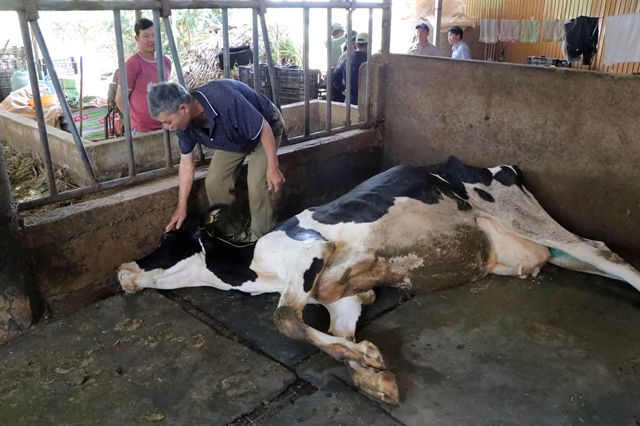 Society
Society


|
| A grieving farmer in Đơn Dương District bids farewell to his family's most productive dairy cow on August 8. — VNA/VNS Photo Quốc Hùng |
HÀ NỘI — Deputy Minister of Agriculture and Rural Development Phùng Đức Tiến has confirmed that the recent mass deaths of dairy cows in Lâm Đồng Province are linked to vaccinations.
By Sunday, nearly 4,500 cows have been affected by a diarrhoea outbreak, with 193 confirmed deaths. The outbreak began in late July and has primarily impacted dairy herds in the Đơn Dương and Đức Trọng districts.
Local farmers reported that the cows began experiencing symptoms of diarrhoea, fever, and gastrointestinal bleeding shortly after receiving vaccinations for lumpy skin disease. This led to suspicions that the vaccine may be the factor behind the deaths.
Deputy Minister Tiến visited the affected areas on Saturday and acknowledged the link between the vaccinations and the outbreak.
"On behalf of the Ministry of Agriculture and Rural Development, I confirm that vaccination has an impact," he said.
The ministry has directed the Department of Animal Health to develop a treatment protocol for affected cows and to conduct further testing to determine the exact cause of the outbreak.
In the meantime, the ministry has pledged to provide support to farmers in the form of medical supplies and medicines. It is also working to determine the extent of the damage and will provide compensation or assistance as needed.
In a recent interview with a Vietnam News Agency reporter, Deputy Minister Tiến revealed that two vaccination programmes had taken place about a half month apart in the locality, with the second group of cows showing ongoing illness even nine days after the injection.
"All cows received the same batch of vaccine," he said. "This vaccine has been widely used in other provinces, primarily on yellow cows, with no reported issues. However, the nearly 9,000 cows vaccinated in Lâm Đồng were dairy cows."
He also said the ministry had requested a detailed report from the vaccine manufacturer Navetco and would carefully review the entire vaccination process, from research to production, to determine the cause of the outbreak.
When asked about potential hesitancy among farmers to vaccinate their livestock in light of the incident, he acknowledged the understandable fear. However, he expressed confidence that once the cause is identified and addressed, farmers would regain trust in vaccination programmes.
He pointed to the success of vaccines for other diseases, such as bird flu, lumpy skin disease and foot-and-mouth disease, emphasising their crucial role in protecting livestock and ensuring stable agricultural production. — VNS




